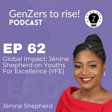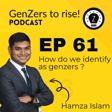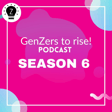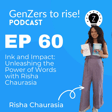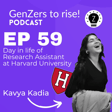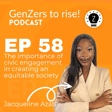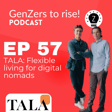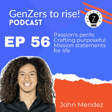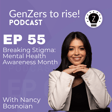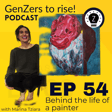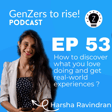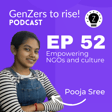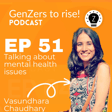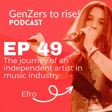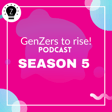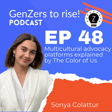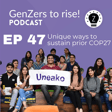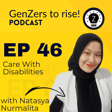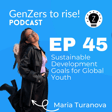Become a Creator today!Start creating today - Share your story with the world!
Start for free
00:00:00
00:00:01

Learning about the sustainable development goals with the De Nsentip twins
In this episode, we discuss Uforo and Eduek’s efforts to incorporate the UN’s sustainable development goals into education. The SDGs are 17 goals aiming bring the world into an ideal state. This includes improving education, environment, equality, health, and more. We will also be discussing ways you can partner with different organizations in order to support a cause that you are passionate about.
Petition and social media at https://lnkfi.re/de-nsentip-twins
Follow ChangemakerZ at https://go.changemakerz.org/follow
Episode's link: https://podcast.changemakerz.org/de-nsentip-twins
Produced by Vasilis Skarleas
Transcript
Introduction to Changemakers Team
00:00:01
Speaker
Hello everyone, I'm Saloni. And I'm Vassilis. We run Changemakers team, a student-run initiative that aims to empower, educate and connect Gen Zers interested in entrepreneurship. We interview teenagers with impactful projects and create resources to help you change the world. If they can't do it, so can you.
00:00:23
Speaker
On this podcast, we discuss the logistics of creating different types of projects with Gen Zers who have already done it. We will leave our social media and website information in the description.
Meet the Guests: Ufuro and Edwek
00:00:41
Speaker
Hello, guys, and thanks for joining today's episode. We have a special guest for you today. Two, actually. Here with us today are the Dinescent Tip twins.
00:00:53
Speaker
Ufuro and Edwek coming from Nigeria. They are the founders of Rekindle Worlds and ambassadors at Change Maker Network by Thread Media. And that might sound familiar from one of our previous episodes with Jane Goss. Thank you guys for joining us today. We're so excited to have you here. Thank you. We're excited to be here too.
Rekindled World and the SDGs
00:01:16
Speaker
So tell us a little bit more about why you started Rekindled World and how you guys are pushing people to incorporate the sustainable development goals into education. Okay, we started the Rekindled World because we wanted to create a platform for youngsters to work collectively to create the change we want to see in the world. So yes, that's why we started the Rekindled World.
00:01:42
Speaker
And also a platform to achieve the sustainable development goals, work on projects to achieve the sustainable development goals. Yes. And for integrating the SDGs, educational curriculum, that's more like a personal project. It doesn't have to do with our organization. So yes, that's it. Wow, that sounds awesome. Yeah.
00:02:09
Speaker
And what are your sustainable development goals and why are they important? Okay, the sustainable development goals could also be called global goals. And they are collection of 17 interlinked goals targeted at solving economic, social and ecological problems. And yeah, that's why they are very important because they help to solve those problems and create a sustainable world
00:02:37
Speaker
between 2030 to 2050. And the SDGs have 169 targets and more than 200 indicators. Wow. Those are some big numbers. I hear they're around like 17 goals in total, right? Yes.
00:02:59
Speaker
Yeah, so since they're kind of a lot, how do we reach all of these goals? Are there any specific goals that we should be prioritizing first? Yeah, to us, we feel it's education. Yes, because education is the foundation and bedrock for development.
00:03:19
Speaker
and achievement of the sustainable development goals. And also, people might actually be like, it should be climate change, which is SDG 13. But if you don't know ways in which you could actually solve climate change and plastic pollution, meaning if you're not educated on how to solve these problems, it's more like achieving
00:03:47
Speaker
target for SDG 13 is far fetched so if we are educated and if the number for lack of access to education is decreased there's going to be so much development and we're going to achieve the sustainable development goals. Education is the education license of the darkness of ignorance so we feel
00:04:13
Speaker
SDG4, which is quality education should be prioritized. Yeah. Oh, wow. That's really interesting to see how all these different goals kind of overlap with each other.
Contributing to SDGs: Research and Community Building
00:04:24
Speaker
And also you mentioned that education is one of the things that we should prioritize, but in general, how people can contribute to these goals in their everyday life and get involved with organizations that are trying to reach them.
00:04:41
Speaker
okay to begin with research is very important yes research that means we must be educated about a particular thing that we want to change then we should try to build a community because the community serves as a support system possibly when we feel that things are going the right way and the community would also help to build momentum yes so
00:05:11
Speaker
You also try to reach out to your targeted audience. Yes. Then from there you could try to reach out to like minds like you. That's when the organization comes in. Then you could just get creative about a particular way you want to raise awareness about a topic or an issue you care about. I see. And what other organizations are you involved with?
Organizational Involvement and Grants
00:05:38
Speaker
Okay, so personally, like individually, we've been involved with organizations and collectively we've been involved with organizations. So we've been involved with Thread and Thread is an organization shaped by youth culture powered by social change. We've been involved with Malala Fund, yes, which is actually an organization working towards girls' education.
00:06:08
Speaker
And assembly to assembly is an organization by girls for girls digital publication and newsletter created by Malala for girls to speak up on issues that matter to them without being judged. And we've been featured on ideas and our work has been featured on both Malala fund and assembly. And then Linktree, Linktree we recently got passion fund. Okay. We have passion fund gold winners. Yeah.
00:06:36
Speaker
of LinkedIn, we received a grant to send 100 girls in our community to schools and teach them basic skills. Yeah. And then AstaTech, we launched a partnership program with them. And AstaTech is an organization implementing SDGs in education. However, we've also been involved with state overview
00:07:00
Speaker
Instead of youth is a community that shares ideas and take actions on the SDGs. And finally, Gallup. Gallup is United Nation Foundation initiative, uniting girls to change the world. So we're going to have a little break and we will come back to you shortly.
00:07:21
Speaker
Wow, that's awesome. You guys are involved in so many things like thread media, assembly, link tree, and you have so many different projects, such as incorporating these SGDs into education. So how do you bring awareness to these social issues and make sure that this movement is getting across to as many people as possible? Okay. So we, how we bring awareness. So there are many ways to bring awareness. Yes.
00:07:48
Speaker
So first, before you bring awareness, you have to know what your movement is about. You have to know the category it falls under before you start creating awareness. So after you know the category your movement falls under, you do so much research on it. Yes, because you want to know what it's about. You don't just start creating awareness. And then once you know what it's about and you research the needs, you create a community of people
00:08:18
Speaker
community of people that you would teach and tell them this is what it's about. So that because community of people also help mentally because there are times you would feel like giving up or you just go back to your community. They're like, you can do this. So you get that. And then after you create your community,
00:08:38
Speaker
You start working on projects, launching projects and also reaching out to the media. Yes, media using social media and media to fight for the cause you believe in. And lastly, reaching out to your decision makers. Yes, the people that would help implement your movement. So that's it. A community usually is a team of people that they are very engaged with what
00:09:08
Speaker
an organization or a project is promoting and they can lead to become great supporters of other actions. You are running a petition with subject inclusion of the SDGs in educational curriculums globally.
Petition for SDGs in Education
00:09:24
Speaker
supported also from the United Nations. Would you like to tell us the story behind and its goal? When we discovered that 8 in 10 people do not know about the sustainable development goals, my twin and I decided to start this petition because we want a situation where a lot of people will be aware of the SDGs and in turn live sustainably to create a better world for us.
00:09:54
Speaker
Also, we discovered that during the pandemic, we had a lot of time to explore changemaking activities. Initially, we weren't really used to it because our educational curriculum didn't support changemaking activities. It actually portrays changemaking activities more like governmental or political work.
00:10:18
Speaker
during the pandemic mostly we're always on Instagram 247 and then we saw organizations promoting their changemakers and like we saw global crises that were being spotlighted and we became so interested because we come from a family that do more philanthropic activities and then from there we're like wow this is an interesting
00:10:41
Speaker
think we could participate in. We started reaching out to change makers and participating in meetings, attending meetings, too. And then from there, we were quite different, very different. So when we came back, it was more like we traveled virtually. So when we spoke to our friends, we discovered that there was a difference. There was this difference. They were like, change making activities, what's that? What's the sustainable development goals? It sounded so weird.
00:11:09
Speaker
And we're like, come on. And we're like, we have to do something. So our organization, the Rekindled World, December last year, we hosted an activity, we initiated an activity rather, where people are going to tell us how they would spend their Christmas in favor of the SDGs.
00:11:30
Speaker
So during that time, we got to realize that many people, not only from Nigeria, but across the world, didn't know about the sustainable development goals. And mostly young people were like, well, that means our country is not the only one suffering from this deficiency. And if you want to achieve the sustainable development goals that, you know, which focuses on creating a sustainable world,
00:11:54
Speaker
and a better future, that means it's not going to be possible. So we did a lot of research, we started, we did a survey, we reached out to our friends across the world, and we were like, does the educational curriculum spotlight the SDGs? They were like, no. And they were like, we are so going to start this petition. So yes, that's it. Yeah, that's great.
Advice on Self-awareness and Mental Health
00:12:14
Speaker
Because I think that as Gen Z, the internet and social media is always going to be one of our most useful tools.
00:12:23
Speaker
So what advice do you have for young people that are starting a social movement such as yourselves? The advice I have would be self-awareness, self-educated, because you can't give what you do not have. If you're not educated about a particular thing, you cannot educate people about it as well. So research too is very, very important. Then personally,
00:12:52
Speaker
Confidence is also a very important tool. And be creative too. Yes, you have to be creative. Try different ways on how you feel reaching out to your targeted audience is going to work out. So you have to be creative. You have to do many things. You have to think outside the box, come out of your comfort zone.
00:13:12
Speaker
Before we could actually, personally for us, before we could do our petition, there were things we never imagined we could do, never. But then this whole movement has exposed us to many activities.
00:13:28
Speaker
and many people too so there's a time you would have to come out from your comfort and come out of your comfort zone and then serve love too come on please take care of yourself you need it you need it you need to take care of your mental health because if you are not strong inside you can't give what you don't have you have to be strong yes and learn to accept um criticism because it's going you're going to expect a lot
00:13:54
Speaker
These are some great pieces of advice.
Boosting Confidence Tips
00:13:57
Speaker
And how do we increase confidence, creativity and self-education? Are there any tips do you have for improving our mental health? Okay, for the mental health. Okay, for confidence.
00:14:11
Speaker
reading people's biography watching people's documentary can help like for you because when at times we feel that certain things that happen to us like is the worst like our condition is the worst but when you see another person that felt the same way you did or overcame it and is a very prominent personality you will tend to
00:14:36
Speaker
to want to like throw into the same thing that the person did so yes that's very important you could also read inspirational books yeah that really helped us while we were growing up we didn't actually have confidence but what really helped was my mom because she was really there for us and we were so close to her that anything that happened to us we just tell her
00:15:00
Speaker
so books to help mom, help friends and things like that for the confidence. So actually every morning before like when we wake up we play music yeah you know all these hyping songs like for each day you need the hype to start it.
00:15:17
Speaker
So we play music and then we just do free stuff, we dance. Come on, you don't need to see us dancing, you just so laugh. So then we actually, from there, there's a time we start playing documentaries.
00:15:33
Speaker
Oh, yeah, interviews from Oprah Winfrey, Michelle Obama, you know, we just played our doing activities at the same time. And the interesting thing is their conversations usually have impactful quotes. Yeah, so we listen to it. And then we actually have a place in our room full of papers. Yeah.
00:15:56
Speaker
In the paper, we write motivational code. So every time we just go there and read it. And one of my best is we come as one and stand as 10,000. And anytime I feel so sad or like I feel nervous and I want to maybe I want to do something that requires my confidence, I just say that I come as one and stand as 10,000.
00:16:24
Speaker
Yeah, and that alone makes me feel so powerful. So I feel if you want to be confident, just go for quotes.
00:16:33
Speaker
just read quotes, tell yourself you can do it. You're not the only person. And it's always interesting when you hear the story of important people, because you tend to be like, oh my god, you're so perfect. But when you know that they are not actually, maybe their childhood wasn't perfect. They had to fight low self-esteem. You're like, OK, so these guys are quite like me. So I could also do more. I could be the best. I am the best. So yes.
Conclusion and Engagement
00:17:02
Speaker
Yeah, I love what you said about learning from other people's biographies and stories. Like that's exactly what we're trying to do over here by showcasing the stories of entrepreneurs and changemakers such as yourself and talk about like your mistakes and your journey so other people can feel like they can do it too. Oh, that's great. That's amazing.
00:17:26
Speaker
I think that this is for today's episode. We would like to thank the audience and team trends for being part of this amazing conversation. Yeah, thank you so much. Don't forget to sign the SD-dispetition for educational curriculums by following the link in the description. We hope that you loved this episode. And until next time, keep changing the world, guys. We hope you guys enjoyed our conversation. We had such a great time. Make sure you leave us a review.
00:17:56
Speaker
You can also follow us on Instagram at changemaker.c to keep up with all of our new content. We also have a Facebook page called changemakerc, but you'll need to look out because I honestly don't even know how Facebook works.
